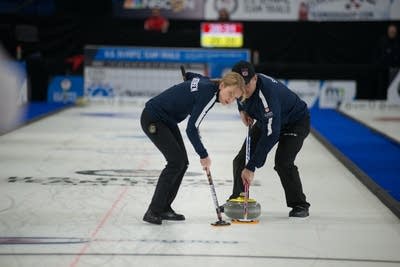Photos: First ever mixed doubles curlers headed to the Olympics

Go Deeper.
Create an account or log in to save stories.
Like this?
Thanks for liking this story! We have added it to a list of your favorite stories.
Amid the rattle of cowbells and applause from onlookers, pairs of curlers competed over the weekend in Blaine to become the first ever U.S. Olympics mixed doubles curling team.
Siblings Matt and Becca Hamilton of McFarland, Wis., will represent the United States at the 2018 Winter Olympics in South Korea. The pair won their match Sunday afternoon against Cory Christensen of Duluth and John Shuster of Superior, Wis., in a score of 6 to 5.
It will be the first time medals are awarded for mixed doubles curling, which only has two players per team instead of the four in traditional curling.
Curling is a family affair for many, including the Persingers from Alaska. Ken Persinger was in town to watch his daughter Vicky Persinger compete. His family travels all around to watch her play. He himself still curls at least once a week.
Turn Up Your Support
MPR News helps you turn down the noise and build shared understanding. Turn up your support for this public resource and keep trusted journalism accessible to all.
"The whole curling community basically is one big family, everybody always pulls together for everybody," Ken Persinger said. "It's really unique to actually be a part of this sport."
Doubles curling might be new to the Olympics, but the athletes take it seriously. Player Vicky Persinger has been curling since she was 5. The 25-year-old schedules her life around the sport.
"I live in Fairbanks, Alaska, normally and during the summer, because that's where I'm from," Vicky Persinger said. "Then I relocate to St. Paul just for the season, like late August to spring-ish, depending on how well we're doing."
Mary Lee Kreger came to the finals Sunday as a spectator. She's what she calls a "sweeping beauty" with the Brainerd Lakes Curling Association.
"It's the queen of sports. Curling is really the ultimate sport," Kreger said. "You don't have to run fast. You don't have to catch things flying in the air at your face. It's a game of thought and skill and physics."






